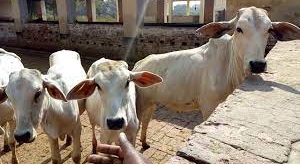Varanasi to have country’s first conservation centre for Gangatiri cows
Lucknow, Feb 8 , The Uttar Pradesh government will set up the country’s first conservation centre for Gangatiri, a breed of cows in Varanasi.
This breed of cows originates along the Ganga banks. The state govt will establish a centre for genetic improvement and propagation of the breed in Varanasi with the help of the Central government.
The foundation stone might be laid this month and it would be ready in a year, officials said.
Over the years, Gangatiri has been significantly overshadowed by high-yielding cow breeds like Sahiwal. But the technology used at the centre will help produce cows of high genetic merit using the IVF and embryo transfer technology (ETT), in which embryos from genetically superior cows would be disseminated to other females to increase the number of genetically superior progenies.
“It will be a game changer in enhancing production of genetically superior Gangatiri cows,” said Rajneesh Dube, additional chief secretary (ACS) and chairman, UP livestock development board (UPLDB).
The project will impact farmers of at least 30 districts in eastern UP and 20 districts in Bihar, as it will help them rear superior cows of the local breed for increased milk production and income.
“Female cows of high genetic merit producing over 3,000 litre milk in lactation cycle will be conserved and procured from local farmers to propagate elite germplasm further,” said Dr Neeraj Gupta, CEO, UPLDB.
Uttar Pradesh has a pure germplasm of the breed, as a herd of around 400 Gangatiri cows is being maintained at higher productivity level at state livestock and agricultural farm at Shahanshahpur in Varanasi, which was established in 1950.
Gangatiri, being a native breed, has many merits, like high adaptability to the region and lesser input cost. The native breeds are not only resistant to a lot of diseases but also economical.
The cow weighs about 300-350 kg and yields 8-10 litre milk every day. The breed was registered by National Bureau of Animal Genetic Resources (NBAGR) in 2015.


